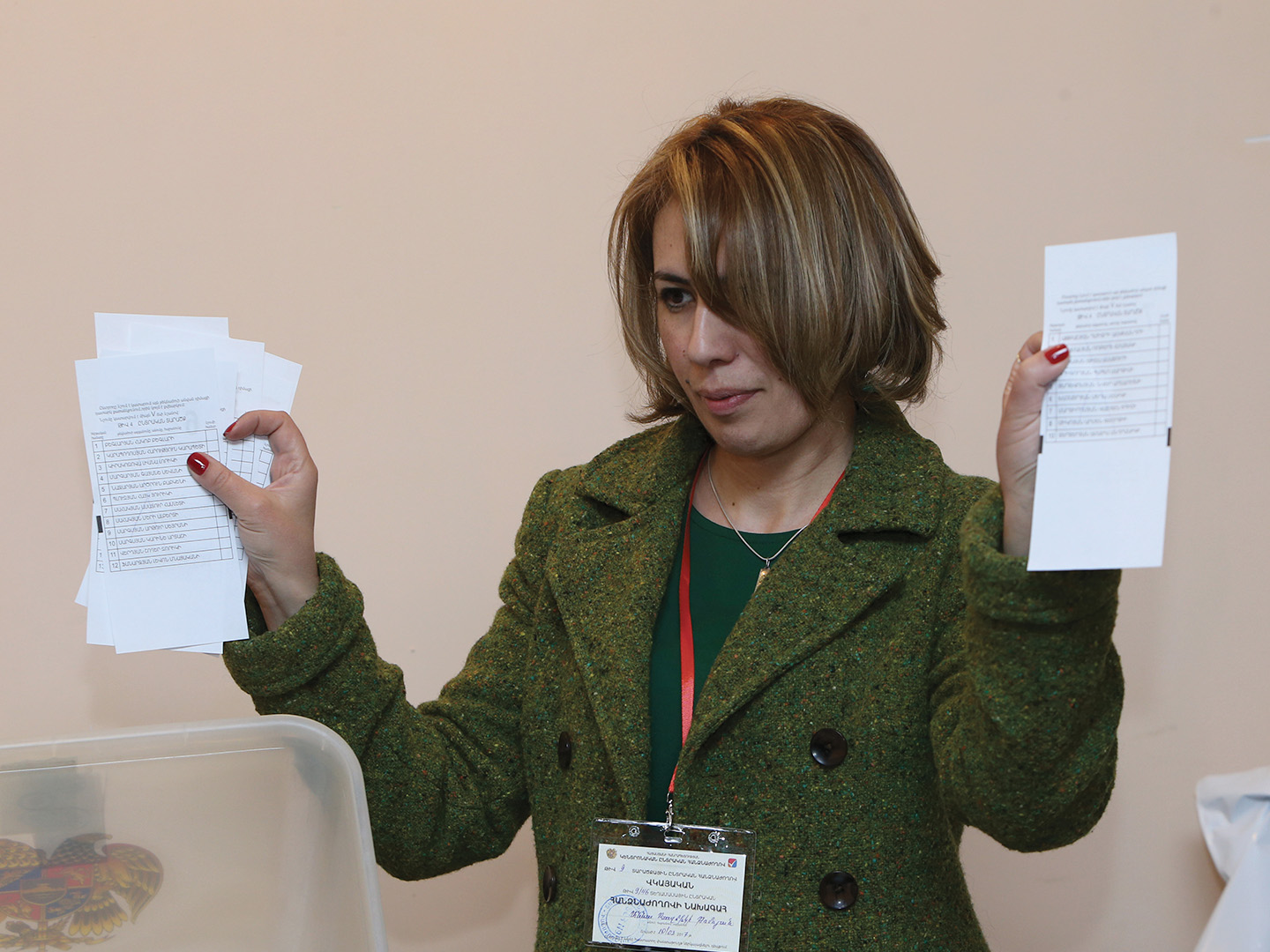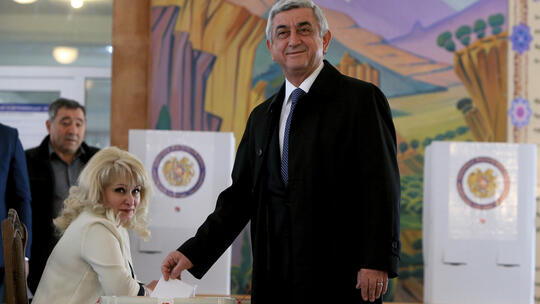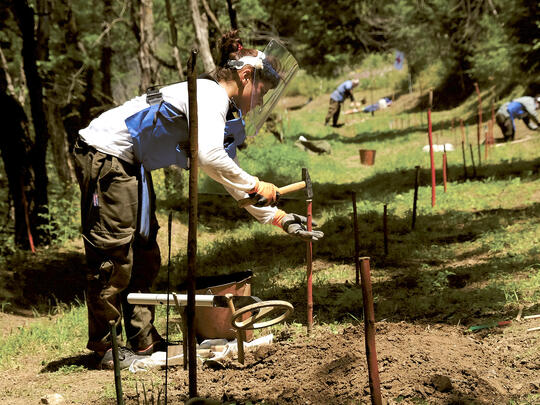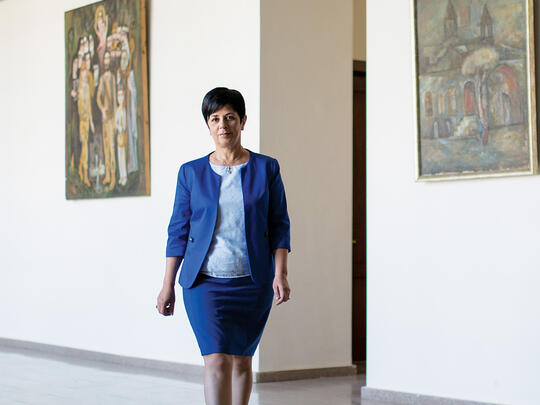Five months after President Serzh Sargsyan’s ruling Republican Party won a majority of seats in Armenia’s parliamentary elections, what has changed for the state of Armenian democracy and what are the implications for the transition of power in 2018? While it may be too early still to reach any definitive conclusions, there are solid grounds for optimism.
April’s elections may not have elicited great public interest, but the result was no less extraordinary, not so much for what transpired as for what did not. For the first time in recent memory, the opposition did not contest the results nor call for public protests. Instead, the unprecedented elections—the first under a new constitution which will see Parliament, and not voters, elect the next president in 2018—unfolded in a remarkably calm and uneventful manner. A substantial total of 1.58 million eligible voters cast their ballots, 61 percent of the electorate, to elect a Parliament that replaces the president as Armenia’s highest political authority.
While not without some controversy, including a few reports of political pressure on public servants in schools and hospitals and other irregularities, the vote was widely hailed as reflecting the will of the Armenian people. For a nation whose previous recent elections have been highly contested and marred by allegations of fraud, vote buying and voter intimidation, April’s results were considered the most credible in recent history, marking a significant step on a new more progressive path for Armenia.
April’s election results were considered the most credible in recent history, marking a significant step on a new more progressive path for Armenia.
In its final report released July 10, the Organization for Security and Cooperation in Europe (OSCE) Office for Democratic Institutions and Human Rights concluded that fundamental freedoms were generally respected and candidates were able to campaign without restrictions. OSCE observers stressed that overall the election was well organized while the basic rights and freedoms of citizens were protected. In addition, the report praised the recent legal reforms, improved accuracy of voter lists and the application of new technology to prevent fraud, including the installation of 1,500 live-streaming webcams in polling stations and electronic voter authentication devices with fingerprint recognition software paid for by the European Union and the United States.
The Head of the Delegation from the Parliamentary Assembly of the Council of Europe, Liliane Maury Pasquier, similarly lauded Armenia’s electoral progress. “There is little doubt that, since the last time the citizens of Armenia voted, efforts have been made, including through logistical improvements, to raise the quality of the electoral process. The authorities should be praised for working to inform the electorate of this new, quite complex, electoral legislation,” she stated.
The parliamentary elections witnessed unprecedented levels of support and coordination from international monitoring groups, local civic activists and diaspora Armenians including celebrities such as Serj Tankian, Atom Egoyan and Arsinée Khanjian—all of whom helped ensure a smooth voting process in more than 2,000 polling stations. The large number of both international and local observers, along with the better than expected voter turnout, was a positive reflection that Armenian society is beginning to take greater responsibility of the political process and view elections as a means of achieving change in Armenia as opposed to a closed political contest far removed from the lives of ordinary Armenian citizens.
As a result of recent landmark electoral reforms, the make-up of the new Armenian parliament is also more representative, consisting of four parties. The ruling Republican Party, with 58 deputies, Bloc Tsarukyan with 31 MPs, Bloc Yelk with nine members and Dashnaktsutyun with five deputies. As mandated under Armenia’s new electoral criteria, Armenia’s Kurdish, Yezidi, Assyrian and Russian national minority communities are also represented in the new Parliament with three members among the Republican Party and one with the Bloc Tsarukyan.
2018 and beyond?
As Armenia transitions from a presidential to a parliamentary political system, the mandate of the president has been substantially reduced. The next president will now be chosen by parliament for a seven-year term with no possibility of re-election. However, the victory of the Republican Party—at the helm of government since 1999—guarantees its hold on power in the coming years.
The electoral result also facilitates a continued political role for current President Serzh Sargsyan after his term expires in 2018. Many critics have already widely interpreted the political reforms as an attempt by President Sargysan to avoid relinquishing executive power. Despite repeated denials, the 63-year-old Armenian leader has refused to shed light on his political future, insisting that there is a lot of time left before his mandate runs out in April 2018. In a recent interview Sargsyan stated that “Armenia no longer has a person-centered government, and I think our people deserve credit for that.” At the same time he did not rule out the possibility of a new role in government either as prime minister or chairman of the party. And with his party’s electoral success, he has the option of avoiding an early political retirement. The power struggle within the party will now become the main focus of attention, shaping the trajectory of the country’s leadership and development for the next five years.

The intrigue surrounding President Serzh Sargsyan’s political future has overshadowed other implications of April’s parliamentary elections and the ongoing transition from a presidential to a parliamentary model. Of particular note is the future of Armenia’s international allegiances. To what extent will the parliament, with its much greater role in formulating the country’s foreign policy, remain committed to Armenia’s strategic alliance with Russia? Or will the success of the parliamentary elections continue to create new opportunities for greater cooperation with Europe, including the newly negotiated Comprehensive and Enhanced Partnership Agreement?
Despite the potential for greater democratization set forth by April’s parliamentary elections, more steps are needed to completely remove long-standing doubts about the reliability and integrity of Armenia’s electoral process. The consolidation of Armenia’s democratic amendments could also be influenced by the current economic situation. A rapid rise in the cost of food compounded by low salaries and fixed pensions is a recipe for social unrest and could spark another cycle of intense protests and a violent police crackdown.
While the political model may have successfully changed, until the people wielding power in Parliament are replaced, the prospects of real democratic change and increased public influence on policymaking will be limited. “The peaceful transition of power from one party to another is the cornerstone of democracy and pluralism, but the past 25 years is a very small amount of time in the lifespan of historical change,” remarked Director of the Caucasus Institute Alexander Iskandaryan. “It may take decades before Armenia can truly establish that political culture.”
Democratic change cannot be achieved by electoral reforms and party-building alone. It will require everyday changes not only from politicians but all levels of Armenian society. A more effective approach would be to also focus on the underlying conditions that allow democracies to flourish—greater access to education, improved healthcare and economic growth. Over the next five years, the new parliament will be challenged to deliver results. Armenians and the opposition party they elected must continue to hold the government accountable.
Banner photo by Vahram Baghdasaryan














